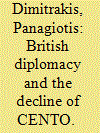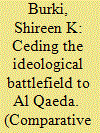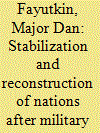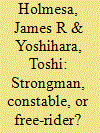| Srl | Item |
| 1 |
ID:
104095


|
|
|
|
|
| Publication |
2009.
|
| Summary/Abstract |
The Central Treaty Organization (CENTO) is considered the failed West-inspired alliance of the Cold War that was dissolved in 1979 after the fall of the Shah. Britain found the regional member states, Iran, Turkey and Pakistan, unwilling to focus on a common deterrent strategy or assign forces to this alliance. For two decades Pakistan wanted to turn CENTO against India, but London resisted any policy that could offend New Delhi. Eventually Whitehall admitted that this organization was nothing more than "a paper tiger" and, in accordance with the 1974 Defence Review, opted for military disengagement from the alliance. British policy was based on a realist estimate: CENTO did not face the prospect of Russian aggression. Furthermore, no military contingency planning existed for the cooperation of CENTO with NATO.
|
|
|
|
|
|
|
|
|
|
|
|
|
|
|
|
| 2 |
ID:
104098


|
|
|
|
|
| Publication |
2009.
|
| Summary/Abstract |
The Bush administration ceded the ideological battlefield to Al Qaeda and affiliates in its Global War on Terror when it failed to clearly enunciate that the terrorist threat to the United States was based on the Wahhabi-Salafi-Deobandi ideological axis. The failure to define the threat by non-state, ideologically driven, actors led to an incorrect approach or strategy that relied more on conventional, kinetic, measures with limited success. The new Obama administration has a window of opportunity to rectify this and to challenge the legitimacy of this ideology in a multipronged strategy of which strategic communication would constitute a critical component.
|
|
|
|
|
|
|
|
|
|
|
|
|
|
|
|
| 3 |
ID:
104099


|
|
|
|
|
| Publication |
2009.
|
| Summary/Abstract |
This article focuses on an analysis of two very different approaches for stabilization and reconstruction (S&R) used by the United States in Afghanistan and the Russian Federation in Chechnya. The article discusses "Stabilization and Reconstruction" (S&R) according to military doctrines, the possibility of the S&R of the nation, the doctrinal framework for S&R processes. The Russian Federation focused its S&R policy on rebuilding the security structures in Chechnya in order to guarantee a stable security situation in the Chechen Republic. The U.S. S&R effort revolved around the reconstruction of all the security, social and financial structures of a society based on democratic principles The significant lesson from the Afghanistan and Chechnya experiences is that it is necessary to build-up the legitimate local security and social structures, which will control the situation.
|
|
|
|
|
|
|
|
|
|
|
|
|
|
|
|
| 4 |
ID:
104097


|
|
|
|
|
| Publication |
2009.
|
| Summary/Abstract |
Many scholars assume that the European model of realpolitik will prevail in Asia as the dual rise of China and India reorders regional politics. Others predict that Asia's China-centric tradition of hierarchy will reassert itself. But Indians look as much to nineteenth-century U.S. history as to any European or Asian model. Indeed, successive prime ministers explicitly cited the Monroe Doctrine to justify intervention in hotspots around the Indian periphery. But the Monroe Doctrine underwent several phases during America's rise to world power. These phases can help South Asia analysts project possible futures for Indian maritime strategy.
|
|
|
|
|
|
|
|
|
|
|
|
|
|
|
|
| 5 |
ID:
104092


|
|
|
|
|
| Publication |
2009.
|
| Summary/Abstract |
With President Barack Obama's recent pledge to work toward U.S. Senate ratification of the Comprehensive Nuclear Test Ban Treaty (the Treaty or CTBT) as quickly as possible and with emerging consensus in Washington on the need to take action to stop nuclear proliferation, ratification is a more realistic possibility in the near future than at any point in the last decade. Yet, despite this positive momentum, ratification could likely depend on the votes of several moderate Senate Republicans. This paper argues that while moderate Republicans might support the Treaty's goals, they are not likely to vote in favor of ratification. This paper examines the consequences of not ratifying the Treaty and concludes that, with the current U.S. moratorium on testing still in place, ratification at this time is not necessary to achieve U.S. non-proliferation goals. In fact, failing to secure ratification, a real possibility, could have significant political consequences for the Obama Administration and might set back U.S. nuclear non-proliferation efforts for years to come.
|
|
|
|
|
|
|
|
|
|
|
|
|
|
|
|